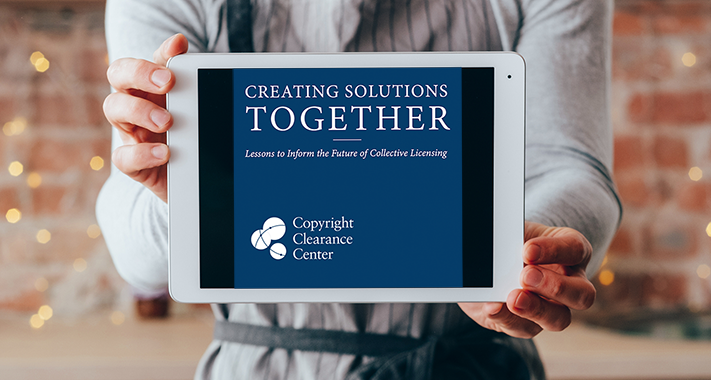CCC is pleased to offer an ebook, “Creating Solutions Together: Lessons to Inform the Future of Collective Licensing.” We published it to help the market understand the importance of licensing in relation to publishing, the origins of collective licensing as a business model, and how CCC was established to help licensees access high-value content while ensuring appropriate remuneration back to publishers and other rightsholders. You can read and download it here.
The “Texaco” case — concerning internal-use copyright infringement and licensing in a corporate setting — was resolved 25 years ago and has ever since served as a benchmark case in that domain. To mark this anniversary, CCC called together three leading copyright and licensing experts, Lois Wasoff, Mark Seeley, and Bruce Rich, to contribute essays to this ebook. This post provides an overview of “Creating Solutions Together,” and in the weeks to come, I’ll post more the topics raised by our contributors.
The overall purpose of “Creating Solutions Together” is to introduce some of the whys and hows of collective licensing generally. First created as a tool by copyright rightsholders in France in the late 18th century (very shortly after the development of the first copyright regimes in most countries), collective licensing has served an increasingly valuable purpose as technology has made the use of others’ copyrighted works easier. From the Industrial Revolution to the Internet Age, collective licensing has been a persistent and effective means to meet market needs.
Collective licensing has made it possible for copyright rightsholders to expand the reach of their works and to collect royalties for use of them on an efficient and effective basis, while also making it possible for users of others’ copyrighted works to derive value from them beyond merely buying copies for their own use. Its success has driven the regular introduction of more and more varied collective licensing systems around the world — some voluntary and created by private parties, with or without government supervision, and some statutory and more or less compulsory, created by governments (and usually administered through a regulated not-for-profit organization). The continuing need for the efficiency and other unique attributes of collective licensing — even in the supposedly “microtransaction-driven” world of the Internet — was made plain as recently as late 2018, when the United States Congress unanimously passed legislation to create and regulate a new form of compulsory collective license for the streaming music field. Similar licenses have likewise been created recently by both governments and private parties in countries around the world.
Voluntary collective licensing of text works as discussed in “Creating Solutions Together” continues to be an important mechanism for making copyright work, as well as an efficient means of making widely available the most in-demand works from a broad swath of rightsholders. CCC looks forward to sparking further discussions of the points raised here. We hope you find these essays well worth taking the time to read them and to contemplate the lessons imparted therein.


